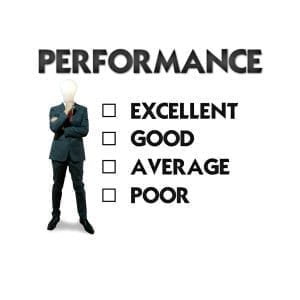Effectiveness
The performance evaluation interview is the crowning event of the performance evaluation system. It is in the performance evaluation interview that the opinions and attitudes toward the performance evaluation are capped. All the performance evaluation system facets (e.g. the instrument, reward structure, ranking system) are typically established prior to the interview and their distribution and assignment is an outcome of decisions completed and recorded during the performance evaluation interview.
 Performance Evaluation Effectiveness
Performance Evaluation Effectiveness
In order to capture the effectiveness of the performance evaluation process it is important to look at the performance evaluation interview and those involved. The supervisor and the employee are typically the two individuals involved in the interview. In capturing what leads to a successful performance evaluation interview there are supervisor and employee characteristics that must be taken into consideration. I suggest that there are supervisor and employee cognitive perceptions that will influence the effectiveness of the performance evaluation above and beyond the instrument used or the system facets. Below I will first, describe supervisor perceptions that will have an impact on the performance evaluation effectiveness and second, describe those employee perceptions that will influence the effectiveness of the performance evaluation.
The hypotheses outlined below have two assumptions. First, the characteristics described will affect the performance evaluation effectiveness above and beyond any instrument or system facet effects. And second the dependent variable is outlined by the organization itself and is held constant between performance evaluation interviews. This is critical as any change in the performance evaluation instrument or the purpose of the appraisal (the dependent variable) will also affect the strength of the relationships described below.
Performance Evaluation: Expectancy Theory
Vroom in his fundamental book “Work and Motivation” describes an expectancy theory of motivation. He defines motivation as “a process governing choices made by persons of lower organisms among alternative forms of voluntary activity”. He describes motivation as an outcome of valence, instrumentality, and expectancy. Valence is the “affective orientations toward particular outcomes” , instrumentality is the link between an outcome of the action performed and the outcomes that stem from the outcome attained by performing the action. Expectancy is the “momentary belief concerning the likelihood that a particular act will be followed by a particular outcome”. Described further this idea is that if a person desires a given outcome (valence) they will have high motivation to work toward that outcome if the outcome is associated with other desired outcomes they want (instrumentation) and if they also perceive that their efforts are likely to bring about the initial outcome (expectancy).
Since its introduction, Vroom’s expectancy theory has been applied to many situations including assessing student motivation, productivity loss in groups, leadership, and job satisfaction. It has been extended into areas as diverse as managerial ethics, and personality impression cues of athletic performance. Vroom’s original expectancy theory is still regularly used to explain motivation in work settings and has been strengthened through 30 years of empirical testing both in within-person and between person research designs.
Expectancy theory suggests that the motivation behind a supervisor accurately and effectively completing the performance evaluation process with a given employee is dependent on the degree of the supervisor perceives that effort put into the performance evaluation process will result in an accurate performance evaluation rating (expectancy), the degree of the supervisor’s perception that an accurate performance evaluation rating will produce performance evaluation effectiveness (Instrumentation), and the value that the supervisor places on an effective performance evaluation (valence). These three supervisor perceptions, valence, instrumentation, and expectancy, are discussed below.
Performance Evaluation: Valence
Expectancy theory assumes that individuals desire some outcomes over others and that individuals are able to choose their actions. It is a strong departure from behaviorism and hedonism because it assumes that individuals reflect and select actions not because they are avoiding pain and seeking pleasure, but because they desire different outcomes and make rational choice on the best methods to achieve those outcomes. In a performance evaluation setting, a supervisor must make a cognitive decision on how accurately he or she will complete the performance evaluation process as outlined in the organizations performance evaluation program. The basis for this decision is the level of importance that the supervisor views in the performance evaluation. If the supervisor views the performance evaluation as extremely important (high valence) it is likely that the supervisor will put forth great effort to complete the performance evaluation accurately. If the supervisor does not value the performance evaluation (low valence) he or she will likely not put forth much effort in completing the performance evaluation accurately.

